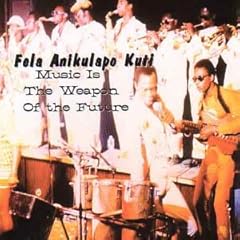Home » Jazz Articles » Album Review » Fela Anikulapo Kuti: Music Is the Weapon of the Future
Fela Anikulapo Kuti: Music Is the Weapon of the Future
On this studio recording released in 1997, Fela joins his usual large ensemble of musicians to deliver three extended pieces which should be familiar to his more avid listeners. The liner notes supply very little information about personnel and the dates of recording, but that is typical of much of his output.
"Go Slow" moves from a walk into a canter, drawing heavily from the energy of funk. A tight horn section delivers a James Brown-styled refrain, leading in and out of extended saxophone solos and vocal interludes. The instrumentals here glow with vitality, typical of this record. This upbeat jam rests in a solid groove and does not travel through many keys. "Rofofo Fight" opens with a gentle rap over ecstatic polyrhythmic drumming.
It's hard here (and elsewhere) to distinguish when Fela is speaking in Yoruba or pidgin English, but his message comes through loud and clear. Like many of his overtly political and humanitarian statements, he cries loudly against violence. (Fela was repeatedly targeted by the Nigerian government and victimized in raids, beatings, and imprisonment.) Finally, with "Suffering and Smiling" he adopts an emphatic pan-African message, drawing attention to the harm that religious imperialism has caused in Africa. At the cost of African welfare, he says, "the Archbishop has much pleasure/the Pope has much enjoyment/Imam has good times."
Nigeria was a very fertile place for musical development in the early '70s, when Fela Kuti first began to receive widespread attention. His vision remained sharp and clear through the next two decades until his untimely death in 1997. He reminded the people of Nigeria (and those of the world) of their common humanity, and he openly questioned the roles of government and other institutions. No wonder the Nigerian government was afraid: over a million people showed up for his funeral procession.
Meanwhile, Fela left us a massive legacy of recordings which testify to truth and love, glowing with spiritual energy and spontaneous group interplay. Listeners with a taste for jazz, funk, and the Afro beat will absorb this music like a sponge.
For more African music reviews, visit our special review page .
Track Listing
Go Slow; Roforofo Fight; Suffering & Smiling.
Personnel
Fela Kuti
saxophoneAlbum information
Title: Music Is the Weapon of the Future | Year Released: 2002 | Record Label: Exworks Records
< Previous
Waves: The Bossa Nova Session
Next >
Feel The Sunshine
Comments
Tags
For the Love of Jazz
 All About Jazz has been a pillar of jazz since 1995, championing it as an art form and, more importantly, supporting the musicians who create it. Our enduring commitment has made "AAJ" one of the most culturally important websites of its kind, read by hundreds of thousands of fans, musicians and industry figures every month.
All About Jazz has been a pillar of jazz since 1995, championing it as an art form and, more importantly, supporting the musicians who create it. Our enduring commitment has made "AAJ" one of the most culturally important websites of its kind, read by hundreds of thousands of fans, musicians and industry figures every month.




















